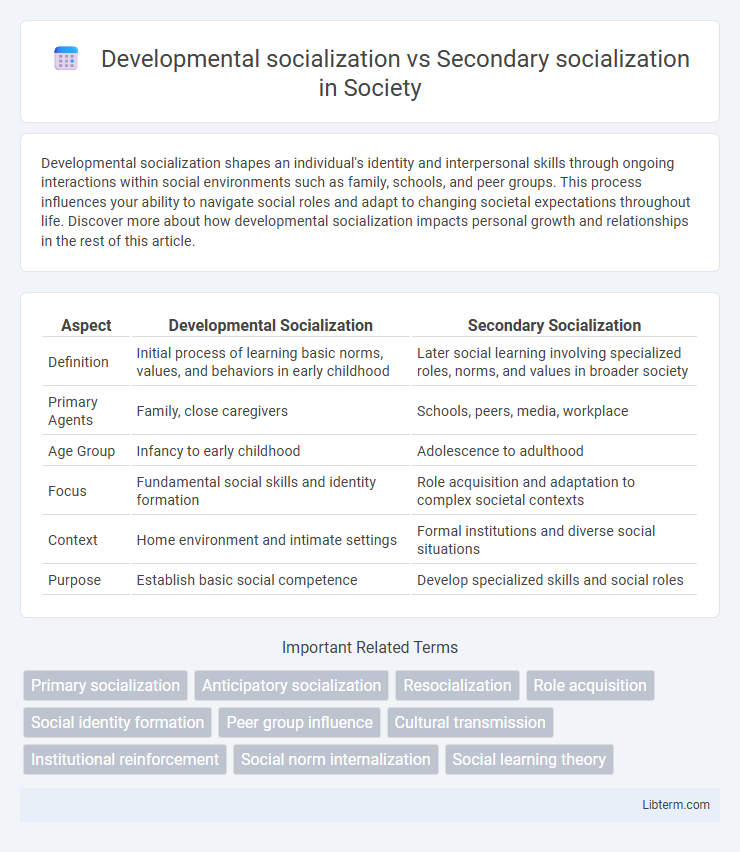Developmental socialization shapes an individual's identity and interpersonal skills through ongoing interactions within social environments such as family, schools, and peer groups. This process influences your ability to navigate social roles and adapt to changing societal expectations throughout life. Discover more about how developmental socialization impacts personal growth and relationships in the rest of this article.
Table of Comparison
| Aspect | Developmental Socialization | Secondary Socialization |
|---|---|---|
| Definition | Initial process of learning basic norms, values, and behaviors in early childhood | Later social learning involving specialized roles, norms, and values in broader society |
| Primary Agents | Family, close caregivers | Schools, peers, media, workplace |
| Age Group | Infancy to early childhood | Adolescence to adulthood |
| Focus | Fundamental social skills and identity formation | Role acquisition and adaptation to complex societal contexts |
| Context | Home environment and intimate settings | Formal institutions and diverse social situations |
| Purpose | Establish basic social competence | Develop specialized skills and social roles |
Introduction to Socialization
Developmental socialization primarily occurs in early childhood, focusing on acquiring fundamental skills, language, and norms through intimate family interactions. Secondary socialization takes place later, during adolescence and adulthood, involving the adaptation to new social environments like schools, workplaces, and peer groups. Both processes are crucial in shaping individual behavior and societal integration, highlighting different stages and contexts of social learning.
Defining Developmental Socialization
Developmental socialization refers to the ongoing process through which individuals acquire and refine skills, values, and behaviors essential for personal growth and adaptation throughout their lifespan. It primarily occurs during childhood but continues as people encounter new environments and roles, shaping identity and social competence. Secondary socialization, in contrast, involves learning appropriate behaviors and norms within specific social contexts beyond the family, such as school, workplace, or peer groups.
Understanding Secondary Socialization
Secondary socialization involves the process of learning appropriate behavior and norms beyond the family, typically occurring in schools, workplaces, and peer groups. It helps individuals adapt to complex social environments by internalizing societal roles, values, and expectations essential for social integration. Understanding secondary socialization is crucial for recognizing how cultural norms and social roles are reinforced throughout adolescence and adulthood.
Key Differences Between Developmental and Secondary Socialization
Developmental socialization primarily occurs during early childhood as individuals acquire basic skills, language, and cultural norms necessary for primary functioning within society, often influenced by family and close caregivers. Secondary socialization takes place later through interactions with broader social institutions such as schools, workplaces, and peer groups, focusing on adapting to specific roles and environments beyond the family unit. Key differences include the timing of socialization, the agents involved, and the complexity of social roles learned, with developmental socialization laying foundational competencies and secondary socialization refining skills for specialized social contexts.
Agents of Developmental Socialization
Agents of developmental socialization primarily include family members, especially parents and siblings, who play crucial roles in shaping early emotional bonding, language acquisition, and basic behavioral norms. Early childhood educators and primary caregivers also significantly influence the initial understanding of social roles and cultural values. These agents establish foundational social skills within intimate, consistent environments, contrasting with the more diverse and impersonal influence of agents in secondary socialization.
Agents of Secondary Socialization
Agents of secondary socialization primarily include peers, educational institutions, workplaces, and media, which shape individuals' behaviors, values, and social skills beyond early childhood. Unlike developmental socialization, which occurs within the family and establishes foundational norms, secondary socialization adapts individuals to new environments and roles throughout life. The influence of formal education and peer groups is particularly critical in reinforcing societal expectations and professional conduct during adolescence and adulthood.
Impact on Individual Identity Formation
Developmental socialization primarily shapes the foundational aspects of individual identity during early childhood through interactions with family and close caregivers, establishing core values, language, and emotional regulation. Secondary socialization occurs later in life through exposure to educational institutions, peer groups, and media, refining social roles, norms, and identity in diverse contexts such as work and culture. The dynamic interplay between developmental and secondary socialization significantly influences a person's evolving self-concept and adaptive social identity across different life stages.
Real-Life Examples of Each Socialization Type
Developmental socialization occurs during early childhood when children learn basic norms, values, and language through family interactions, such as a toddler acquiring speaking skills from parents. Secondary socialization happens later, involving adaptation to new social environments like starting school or joining a workplace, where individuals learn rules and behaviors specific to these settings. For example, a teenager adopting peer group norms at school or a new employee understanding corporate culture exemplify secondary socialization.
Challenges in Developmental vs Secondary Socialization
Challenges in developmental socialization often stem from the initial acquisition of core social skills and identity formation within primary family environments, where inconsistent parenting or limited social interaction can hinder emotional and cognitive growth. Secondary socialization presents distinct difficulties as individuals adapt to complex societal institutions like schools, workplaces, or peer groups, requiring mastery of diverse roles, norms, and language codes that may conflict with primary socialization values. Navigating these challenges demands flexibility and resilience to reconcile early social learning with evolving social expectations in broader contexts.
Conclusion: The Lifelong Process of Socialization
Developmental socialization primarily occurs during early childhood, shaping fundamental identity, language, and norms, whereas secondary socialization continues throughout life, adapting individuals to new roles and environments. Both stages are essential for successful integration into society, with developmental socialization forming the foundation and secondary socialization enabling ongoing learning and adjustment. Lifelong socialization underscores the dynamic nature of human behavior, emphasizing continuous interaction with diverse social contexts and evolving cultural expectations.
Developmental socialization Infographic

 libterm.com
libterm.com